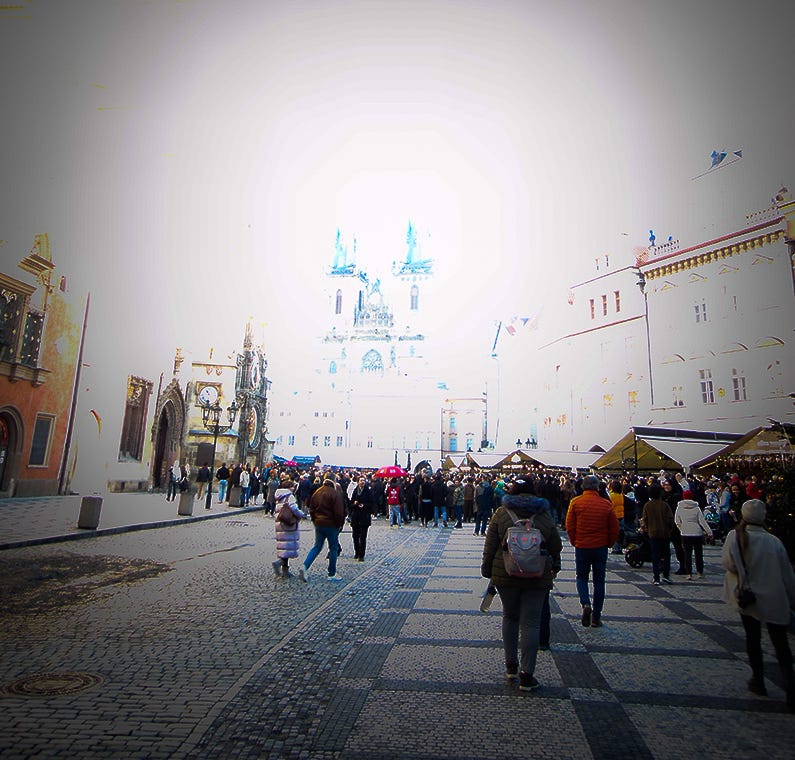bubbles of illusion in a godless world: May 2024 Essay Recommendations
On the apologetic of grace, smooth culture, religiously-themed retreats, and why we're becoming bad people.
Programming note: I’ve been publishing with less frequency here lately, mostly because mental energy has necessarily been going to other things. For the next few months, I’ll publish one essay in the middle of the month and one of these roundups at the end.
Anyway, happy summer! Er, late spring. I hope all of your holidays and planned holidays (and simply days, if there are no holidaying plans) are filled with peace, creativity, and potentially some insights. About this time last year, my sister and I were driving around Iceland, and that experience became rather profound in ways I couldn’t have anticipated. I wrote about that profundity in a short essay presently out in Plough, “In Pursuit of Pure Northernness.”
I’m humbled it shares space with
’s gorgeous piece, Hummingbirds Are Wondrous, and ’ reminder that the natural world is charged with symbolic meaning. Having subscribed to Plough for a couple of years now, I can say it’s consistently thought-provoking and encouraging.the god(s) question
I’m still thinking, reading a lot, and writing a little ;-) about the conversations around the rise of Christianity as cultural bulwark. But it’s easy to get drawn into the Public Intellectual Discourse and lose sight of what’s really at stake in these conversations—not the status of a nation-state, but the status of individual souls. Yours and mine and Richard Dawkins’ and Ayaan Hirsi Ali’s. In her post about the recent Ali-Dawkins dialogue in NYC,
draws us back to the “apologetic of grace,” which is confounding and hard to argue against.This sort of vulnerability from a public intellectual of Hirsi Ali’s stature is rare. It’s clear that Dawkins simply doesn’t know what to do with it, or where to put it. It would be one thing if his old friend had described an intellectual conversion journey à la C.S. Lewis, inspired by books and deep study and long, erudite chats in the woods. But this language is the stuff of Alcoholics Anonymous, of earnest middlebrow testimonies about getting on your knees and calling out to a higher power, and all that…stuff.
Read more: But Now I See. Also check out:
This Quillette piece that my brother sent me: The Religious Instinct in a Godless World, by
.And
’s slight pushback in Christianity Today against the generally anti-bulwark position: Let the Cultural Christians Come unto Jesus.
bubbles of illustion + limited creativity
If you’re reading this substack, you don’t need to be told that human creativity is good and that Apple iPad Pro ad is bad. But sometimes we need the right words to say the things we’re feeling.
supplies those words in his piece, Crushing the Creative Impulse. Pastor laments the rise of “smooth culture,” which rejects the friction that occurs when humans make new things and improve on existing things.Smooth culture, while possessing superficial attraction and visual appeal, does not have the capacity to be beautiful. Beauty requires elements that are foreign to those perceiving it, and those elements are known because of their “roughness,” their negativity. The smooth thing [like the iPad Pro and the type of art it empowers] is not capable of being truly known. It can only be perceived as a reflective surface. …[T]his means that so-called “art” produced in a smooth culture is incapable of being loved. The only way that one can relate to it is with a “like.”
Speaking of creativity mediated by digital platforms—and on a less aesthetically pleasing note—Substack cofounder
’s recent post, The age of the sovereign creator, deserves some tweaking because, well…there is no such thing as a sovereign creator. We are most certainly not entering the age of them. Anyone who does creative work and utilizes the internet to do so has vulnerability points, areas where they rely on a service, platform, technology, or person they don’t wholly control. The adage, no man is an island, applies more to the digital age than to any ages prior. Substack does not enable ‘sovereignty’ on behalf of creators—there’s no need to tell that lie. Thankfully, Substack has level-minded, thoughtful, and dareisay caring people running it, and that’s the best that can be asked for when not everyone has the time, energy, or resources to build their own server (or “stack”) from the ground up.speaking of holidays…
criticizes the bustling retreat industry “which seems to perpetuate structural inequalities whilst professing to care about the wellbeing of individuals…. This industry [also] seems to be co-opting religious language in order to imbue their product with spiritual credentials.” Ach.She also reminds us that
’s new book Fully Alive: Tending to the Soul in Turbulent Times, which I’ll buy and read soonish, is out now. I’m likewise excited for the new season of Oldfield’s podcast, The Sacred, which further explores the book’s themes.become of us
has been on a roll lately, publishing absolute bangers of insight into the current common human condition and saying aloud the things some are afraid even to think. Take her piece, What’s Become Of Us? We’re all keen to how social media, dating apps, and always being online is bad for our mental health. But what if all of this is also simply making us bad people?...the conversation can no longer just be about how bad social media is for our mental health. It has to be how bad it is for our humanity.
…I think more generally our problem is a progressive culture where we are afraid to say what is decent moral conduct, where we can’t really call out what is undignified or distasteful anymore, where we’re terrified to enforce any ethical expectations.
…[People] spend five hours a week taking selfies and don’t see it as vanity. They talk about people’s follower counts like it’s a measure of worth without a thought of what’s becoming of them. They are so obsessed with their digital reputation they can’t see how they are degrading their real life one for it.
Yes! There’s more in this vein…
Jonathan Haidt’s comments on Freya’s piece: On The Degrading Effects of Life Online (After Babel)
Mary Harrington’s Love in the Marketplace (Plough)
- ’s What I’ve Learned from a Decade on the Dating Apps
Another one from Freya: Your Boyfriend Isn’t Your Camera Man (After Babel)
read aloud
An overabundance of reading material and the trend toward individuality makes us forget that, for most of history, people didn’t read alone. People read things together and were read to by others. In a piece for The Atlantic, Alexandra Moe explores the benefits of reading aloud.
Repeating words aloud isn’t just key to memorization…it can be key to identity formation too.
Plenty of solitary vocal reading no doubt consists of deciphering recipes and proofreading work emails, but if you want to reap the full perks, the best selections are poetry and literature. These genres provide access to facets of human experience that can be otherwise unreachable, which helps us process our own emotions and memories, says Philip Davis, an emeritus professor of literature and psychology at the University of Liverpool. Poetry, for example, can induce peak emotional responses, a strong reaction that might include goose bumps or chills. It can help you locate an emotion within yourself, which is important to health as a form of emotional processing.
More here: We’re All Reading Wrong.
And here from my pals at Lorehaven: How Stories Physically Reshape Our Brains for Good or Ill.
Maybe you read this post aloud! Cheers!









Thanks for the shout out 🥰